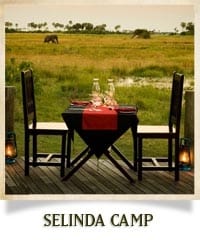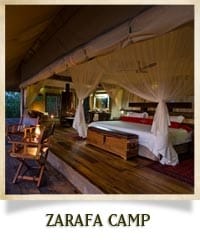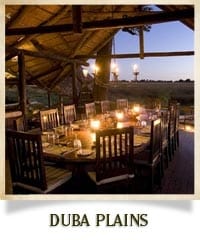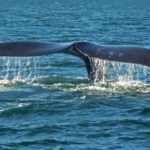Offer details
For guests staying at Selinda Camp and/or Zarafa Camp combined with Duba Plains for a minimum of 6 nights, the inter-camp air transfer will now be automatically upgraded to a COMPLIMENTARY helicopter transfer. This 35 minute helicopter flight offers a uniquely spectacular aerial view of the Northern Okavango Delta region between the Selinda Reserve and Duba Plains.
- Minimum two guests per transfer
- Minimum 6 night stay required between Duba Plains and either Selinda or Zarafa camp in any combination of nights
- Not valid for guides and tour leaders
Validity
- Valid for all new enquiries made as from July 1, 2013
About the Camps
Selinda Camp
 Selinda Camp rests on the banks of the eastern Selinda Spillway in the 32,000-acre Selinda Reserve of northern Botswana. This prime location is deep within rich wildlife territory. Completely rebuilt in 2007, Selinda Camp is a relaxed, yet luxurious tented safari camp and has established itself as one of the gems in the region with a harmonious blend of a classic tented bush camp interwoven with contemporary amenities.
Selinda Camp rests on the banks of the eastern Selinda Spillway in the 32,000-acre Selinda Reserve of northern Botswana. This prime location is deep within rich wildlife territory. Completely rebuilt in 2007, Selinda Camp is a relaxed, yet luxurious tented safari camp and has established itself as one of the gems in the region with a harmonious blend of a classic tented bush camp interwoven with contemporary amenities.
The shaded camp affords extraordinary views over the Selinda Reserve’s prolific floodplains and savannas. Dotting the landscape is commanding borassus palms, where nesting birds roost and baboon spy. The extensive raised decks, surrounding both the main lounge and guest tents, allow guests to enjoy a meal or a relaxing afternoon while still enjoying wildlife viewing. There is a hardly a moment in camp where there isn’t an animal in sight.
There are few places in northern Botswana as dynamic as the Selinda Reserve, which is centered on the famous Selinda Spillway, which weaves its way east, linking the far reaches of the Okavango Delta in the south with the Linyanti water systems in the east.
Zarafa Camp
 Zarafa Camp, located in the 320,000-acre Selinda Reserve is synonymous with exclusivity and perfection. The spirit behind Zarafa Camp comes from Colin Bell, Dereck and Beverly Joubert, who together designed Zarafa to incorporate all the components of what they envisioned as the ‘perfect’ safari camp. It embodies authenticity, luxury and simplicity to create a camp that as been clearly considered, and thoughtfully planned to be as environmentally sensitive as possible. It is the culmination of years of safari experience.
Zarafa Camp, located in the 320,000-acre Selinda Reserve is synonymous with exclusivity and perfection. The spirit behind Zarafa Camp comes from Colin Bell, Dereck and Beverly Joubert, who together designed Zarafa to incorporate all the components of what they envisioned as the ‘perfect’ safari camp. It embodies authenticity, luxury and simplicity to create a camp that as been clearly considered, and thoughtfully planned to be as environmentally sensitive as possible. It is the culmination of years of safari experience.
Re-opened in June 2008 as Zibadianja Camp and later re-named Zarafa, its beautiful design, ‘green’ construction and spectacular new location made it an immediate recipient of numerous accolades. Zarafa Camp sits on an island in the floodplains of southern shores of the Zibadianja Lagoon, which is the source of the Savute Channel. Positioned in the extreme eastern side of the Selinda Reserve, its location is in prime wildlife territory.
Each of the camp’s four immense tented suites are raised up on wooden decking and shaded by a canopy of African ebony and Red ivory trees, each with uninterrupted views.
Zarafa means “the beloved one” or “the lovely one” in Arabic. The name comes from a giraffe, which was presented to Charles X of France in 1826 by the Viceroy of Egypt. The giraffe was a sensation to all who saw her, and provided inspiration. The new Zarafa Camp lives up to the name, inspiring even the well traveled, and renewing the spirit of all who visit.
There are few places in northern Botswana as dynamic as the Selinda Reserve, which is centred on the famous Selinda Spillway, which weaves its way east, linking the far reaches of the Okavango Delta in the south with the Linyanti water systems in the east.
The Selinda Reserve is west (upstream) from Savute Channel and Chobe, so it has all the advantages of both of those famous areas but with the tremendous advantage of exclusivity. It is a truly spectacular and unique landscape.
On safari it is possible to see a tremendous diversity of species, from resident prides of lion to huge herds of elephant and packs of wild dog. It is also home to the ungulates, from the rare roan to the ubiquitous zebra. Nocturnal wildlife is prolific as well, and there are frequent sightings of aardwolf and civet. Exploration of this vast area defies imagination… by foot, 4×4 open game drive vehicle, and pontoon boat
Duba Plains
 Duba Plains Camp, located in the northern reaches of Botswana’s famed Okavango Delta and just north of the Moremi Game Reserve, is a private 77,000-acre reserve. Inaccessible for most of the year by any means other than aircraft, it is this remoteness that solidifies Duba Plains as the soul of ‘wild Africa’. Duba offers just 12 guests an idyllic all-round Okavango experience throughout the year, with vast, seasonally inundated floodplains, which are home to huge herds of buffalo being a highlight.
Duba Plains Camp, located in the northern reaches of Botswana’s famed Okavango Delta and just north of the Moremi Game Reserve, is a private 77,000-acre reserve. Inaccessible for most of the year by any means other than aircraft, it is this remoteness that solidifies Duba Plains as the soul of ‘wild Africa’. Duba offers just 12 guests an idyllic all-round Okavango experience throughout the year, with vast, seasonally inundated floodplains, which are home to huge herds of buffalo being a highlight.
Complemented by permanent channels and a number of larger wooded islands, wildlife diversity is guaranteed. This camp prides itself on the intimacy of ‘home’ with all the touches of personal service and superb safari experiences.
Whether in summer, winter, spring or autumn, Duba Plains is a year round delight, offering large concentrations of plains game congregating on the open plains, while predators lurk in the denser forests on the edge preparing to launch into a hunt.
The permanent waterways provide extraordinary bird watching and a steady supply of water for passing elephant herds. Red lechwe, the consummate Botswana wetland antelope, dash through the Delta waters by the hundreds. Hippo, crocodile, kudu, impala, mongoose, warthog and tsessebe dot the landscape. Even leopard is an increasingly common sighting despite the pressure from the ever-present Duba lions.
The lions, renowned for their pursuits of the buffalo herds, are a formidable force. It’s a perfect recipe: the open plains’ nutritious grasses coupled with the Delta’s clean clear waters to create the perfect habitat for the buffalo. Where these herds abound, the lions are not far behind. Contrary to usual behavior, the Duba lions are most often active during the day hours and many of their famous buffalo hunts occur in broad daylight. The prides occur in extraordinary concentrations and in all combinations of ages and sexes – from young playful cubs to old, wise parents and relatives.
A perfect stay at Duba is three or even four nights, thereby giving guests the opportunity to learn about the lion pride dynamics and the individuals as well as appreciate the complexity of the entire ecosystem and its residents.
Awards
- Member of Relais & Chateaux
- 2013 Safari Awards Winner


Leave a Reply